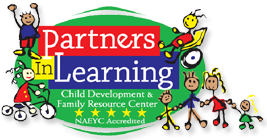Many parents don't really understand the difference in custodial and quality infant child care. Unfortunately, many infant teachers also do not understand the difference. As the director of Partners In Learning for the past 15 years, quality has been our top priority. Anyone can provide custodial care: feeding, changing, and keeping your baby safe. However, it takes a committed, educated teacher that understands brain development to step it up to a high quality learning environment. So... you may be asking yourself, "What does that look like"?
The following are some things to look for when trying to make the tough decision for infant care:
- Is there a curriculum for babies? Ask to see an example of activities planned.
- What resources are offered to parents?
- Is the program accredited by the National Association for the Education of Young Children (NAEYC)?
- Are there enrichments for infants such as storytellers, musicians, sign language, etc.?
- Is the daily schedule adjusted according to each baby’s needs or are all babies on the same schedule?
- Will your child have a consistent group of primary teachers? How long have they been at the center?
- Do teachers interact with children in caring, respectful, and positive ways? Do you see one-to-one conversation with eye contact?
- How will your child’s individual needs be met with the number of children in the room?
- Is the staff child ratio 4 infants per teacher or less?
One of the infant teachers at PIL have music time with the infants.

A newborn's brain is about 25 percent of its approximate adult weight. But by age 3, it has grown dramatically by producing billions of cells and hundreds of trillions of connections, or synapses, between these cells. While we know that the development of a young child's brain takes years to complete, we also know there are many things parents and caregivers can do to help children get off to a good start and establish healthy patterns for life-long learning.
One on one time with infants is very important. This is the time that they build trust in their caregiver and one of the greatest windows of opportunities for brain development. Programs with high staff/infant ratio's cannot offer these opportunities to children.
Our teachers spend most of their day on the floor engaging with the infants. They are building brain development all day long.
Every infant deserves to get off to a great start. Quality care is essential for that to happen. If only custodial care is provided, the foundation for the infants later learning will not be as strong.
Norma W. Honeycutt, Executive






No comments:
Post a Comment